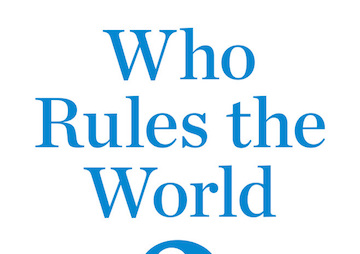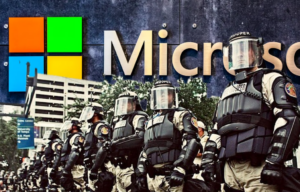American Power Under Challenge: Masters of Mankind (Part 1)
We cannot gain a realistic understanding of who rules the world while ignoring the “masters of mankind,” as Adam Smith called them: in his day, the merchants and manufacturers of England; in ours, multinational conglomerates, huge financial institutions, retail empires and the like. 1
2
3
4
1
2
3
4
There are good reasons to believe that a well-constructed police action, or even serious diplomatic negotiations with the Taliban, might have placed those suspected of the 9/11 crimes in American hands for trial and sentencing. But such options were off the table. Instead, the reflexive choice was large-scale violence — not with the goal of overthrowing the Taliban (that came later) but to make clear U.S. contempt for tentative Taliban offers of the possible extradition of bin Laden. How serious these offers were we do not know, since the possibility of exploring them was never entertained. Or perhaps the United States was just intent on “trying to show its muscle, score a victory and scare everyone in the world. They don’t care about the suffering of the Afghans or how many people we will lose.”
That was the judgment of the highly respected anti-Taliban leader Abdul Haq, one of the many oppositionists who condemned the American bombing campaign launched in October 2001 as “a big setback” for their efforts to overthrow the Taliban from within, a goal they considered within their reach. His judgment is confirmed by Richard A. Clarke, who was chairman of the Counterterrorism Security Group at the White House under President George W. Bush when the plans to attack Afghanistan were made. As Clarke describes the meeting, when informed that the attack would violate international law, “the President yelled in the narrow conference room, ‘I don’t care what the international lawyers say, we are going to kick some ass.'” The attack was also bitterly opposed by the major aid organizations working in Afghanistan, who warned that millions were on the verge of starvation and that the consequences might be horrendous.
The consequences for poor Afghanistan years later need hardly be reviewed.
The next target of the sledgehammer was Iraq. The U.S.-UK invasion, utterly without credible pretext, is the major crime of the twenty-first century. The invasion led to the death of hundreds of thousands of people in a country where the civilian society had already been devastated by American and British sanctions that were regarded as “genocidal” by the two distinguished international diplomats who administered them, and resigned in protest for this reason. The invasion also generated millions of refugees, largely destroyed the country, and instigated a sectarian conflict that is now tearing apart Iraq and the entire region. It is an astonishing fact about our intellectual and moral culture that in informed and enlightened circles it can be called, blandly, “the liberation of Iraq.”
Pentagon and British Ministry of Defense polls found that only 3% of Iraqis regarded the U.S. security role in their neighborhood as legitimate, less than 1% believed that “coalition” (U.S.-UK) forces were good for their security, 80% opposed the presence of coalition forces in the country, and a majority supported attacks on coalition troops. Afghanistan has been destroyed beyond the possibility of reliable polling, but there are indications that something similar may be true there as well. Particularly in Iraq the United States suffered a severe defeat, abandoning its official war aims, and leaving the country under the influence of the sole victor, Iran.
The sledgehammer was also wielded elsewhere, notably in Libya, where the three traditional imperial powers (Britain, France, and the United States) procured Security Council resolution 1973 and instantly violated it, becoming the air force of the rebels. The effect was to undercut the possibility of a peaceful, negotiated settlement; sharply increase casualties (by at least a factor of 10, according to political scientist Alan Kuperman); leave Libya in ruins, in the hands of warring militias; and, more recently, to provide the Islamic State with a base that it can use to spread terror beyond. Quite sensible diplomatic proposals by the African Union, accepted in principle by Libya’s Muammar Qaddafi, were ignored by the imperial triumvirate, as Africa specialist Alex de Waal reviews. A huge flow of weapons and jihadis has spread terror and violence from West Africa (now the champion for terrorist murders) to the Levant, while the NATO attack also sent a flood of refugees from Africa to Europe.
Yet another triumph of “humanitarian intervention,” and, as the long and often ghastly record reveals, not an unusual one, going back to its modern origins four centuries ago.
Noam Chomsky is institute professor emeritus in the Department of Linguistics and Philosophy at Massachusetts Institute of Technology. A TomDispatch regular, among his recent books are Hegemony or Survival and Failed States. This essay, the first of two parts, is excerpted from his new book, Who Rules the World? (Metropolitan Books, 2016). His website is www.chomsky.info.
Follow TomDispatch on Twitter and join us on Facebook. Check out the newest Dispatch Book, Nick Turse’s Next Time They’ll Come to Count the Dead, and Tom Engelhardt’s latest book, Shadow Government: Surveillance, Secret Wars, and a Global Security State in a Single-Superpower World.
Copyright 2016 Noam Chomsky Your support matters…Independent journalism is under threat and overshadowed by heavily funded mainstream media.
You can help level the playing field. Become a member.
Your tax-deductible contribution keeps us digging beneath the headlines to give you thought-provoking, investigative reporting and analysis that unearths what's really happening- without compromise.
Give today to support our courageous, independent journalists.






You need to be a supporter to comment.
There are currently no responses to this article.
Be the first to respond.